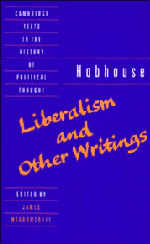Book contents
- Frontmatter
- Contents
- Acknowledgements
- Introduction
- Principal events in the life of L. T. Hobhouse
- Further reading
- Biographical notes
- Liberalism
- Chapter I Before Liberalism
- Chapter II The Elements of Liberalism
- Chapter III The Movement of Theory
- Chapter IV ‘Laissez-faire’
- Chapter V Gladstone and Mill
- Chapter VI The Heart of Liberalism
- Chapter VII The State and the Individual
- Chapter VIII Economic Liberalism
- Chapter IX The Future of Liberalism
- Other Writings
- Index
- Title in the series
Chapter III - The Movement of Theory
Published online by Cambridge University Press: 05 June 2012
- Frontmatter
- Contents
- Acknowledgements
- Introduction
- Principal events in the life of L. T. Hobhouse
- Further reading
- Biographical notes
- Liberalism
- Chapter I Before Liberalism
- Chapter II The Elements of Liberalism
- Chapter III The Movement of Theory
- Chapter IV ‘Laissez-faire’
- Chapter V Gladstone and Mill
- Chapter VI The Heart of Liberalism
- Chapter VII The State and the Individual
- Chapter VIII Economic Liberalism
- Chapter IX The Future of Liberalism
- Other Writings
- Index
- Title in the series
Summary
Great changes are not caused by ideas alone; but they are not effected without ideas. The passions of men must be aroused if the frost of custom is to be broken or the chains of authority burst; but passion of itself is blind and its world is chaotic. To be effective men must act together, and to act together they must have a common understanding and a common object. When it comes to be a question of any far-reaching change, they must not merely conceive their own immediate end with clearness. They must convert others, they must communicate sympathy and win over the unconvinced. Upon the whole, they must show that their object is possible, that it is compatible with existing institutions, or at any rate with some workable form of social life. They are, in fact, driven on by the requirements of their position to the elaboration of ideas, and in the end to some sort of social philosophy; and the philosophies that have driving force behind them are those which arise after this fashion out of the practical demands of human feeling. The philosophies that remain ineffectual and academic are those that are formed by abstract reflection without relation to the thirsty souls of human kind.
In England, it is true, where men are apt to be shy and unhandy in the region of theory, the Liberal movement has often sought to dispense with general principles.
- Type
- Chapter
- Information
- Hobhouse: Liberalism and Other Writings , pp. 24 - 36Publisher: Cambridge University PressPrint publication year: 1994



